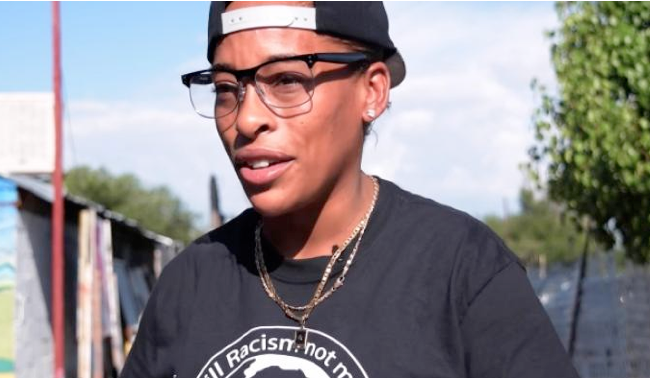CommentsLast week, 28-year-old Jasmine Richards, the founder of Pasadena’s Black Lives Matter movement, was convicted of ‘felony lynching’. The California penal code refers to lynching as “the taking by means of riot of another person from the lawful custody of a peace officer,” though the term brings up visions of KKK hangings in the southern states. Tuesday of this week, Judge Elaine Lu sentenced Richards to 90 days in jail with 18 days served, three years of probation, and one year of anger management.
What led up to this conviction and sentencing? On August 29 of last year, police had responded to a 911 call at a local park. The owner of a nearby restaurant had told the police that an unidentified black woman had skipped out on her check. Richards and other Black Lives Matter supporters were already in the park for a peaceful protest for Kendrec McDade, a 19-year-old unarmed black teen killed by Pasadena police in 2012.
Richards and other Black Lives Matters supporters rushed to the woman’s side when the police were in the process of arresting her. Two days later, Richards was arrested for her attempt to pull the woman from the police.
The initial charges brought against Richards included inciting a riot, child endangerment, delaying and obstructing police officers, and felony lynching. By the June 1 trial date, the other charges were dropped and only the lynching charge remained.
Richards isn’t the first activist to be charged with lynching. Maile Hampton was arrested last April for “lynching” during a Sacramento rally against police brutality. Occupy Oakland activists Tiffany Tran and Alex Brown were charged with “lynching” in 2011 and the following year, Sergio Ballesteros of Occupy Los Angeles was charged with “lynching” when he intervened during an arrest.
However, in all of these other cases, the charges were eventually dropped.
Jasmine Richards is the first African American to be convicted of lynching in the United States, which her attorney Nana Gyami characterizes as politically motivated to stop activists from organizing and from speaking out to challenge the system.
At first notice, the existence of lynching laws in California seems out of character. Most of us think of lynching as the Jim Crow-era terrorizing of black communities in the southern states. Governor Jerry Brown removed the term from the California criminal code in 2015, probably at least in part due to the racist associations.
The state’s anti-lynching laws enacted in1933 when a vigilante mob of 10,000 stormed a San Jose jail to seize two white prisoners who had been confessed to the kidnapping and murder of a 22-year-old son of a store owner. Police guards were attacked by the crowds and in what reads like a scene from To Kill a Mockingbird, the two prisoners were hanged from trees in a nearby park. No one was charged for the deaths but Gov. James Rolph, Jr. was prompted to sign an anti-lynching law.
The federal government had a pretty egregious record during the 1920s through 1930s until a national anti-lynching bill was passed in 1937 but that bill was squashed. California’s law was seen as progressive when the federal government has failed to act.
The lynching charges against activists like Richards seem exploitive and aimed at stopping social change. Violence certainly is not a preferred or legal way to impact social change but it appears that the members of the Black Lives Matter movement are the targets of intimidation, much like earlier civil rights activists.
Additionally, the legal precedent in this case is troubling. People v. Jones (1971) expanded lynching to include a riot of two or more people leading to their own escape. This has been exploited to include activists who resist their arrests, which are often unlawful. It’s important to note that California law states that interfering with police, which is how Deputy District Attorney Christine Kee described Richard’s actions, is a misdemeanor. To charge Richards with the lynching felony sends a message to activists and organizers that protesting is unlawful.
Black Lives Matter organizer Melina Abdullah comments, convicting Richards of lynching is “disgusting and ironic.” It’s hard to argue with that sentiment.
(Beth Cone Kramer is a successful Los Angeles writer and a columnist for CityWatch.)
-cw
Sidebar
Our mission is to promote and facilitate civic engagement and neighborhood empowerment, and to hold area government and its politicians accountable.

 CityWatch Los Angeles
Politics. Perspective. Participation.
CityWatch Los Angeles
Politics. Perspective. Participation.
17
Wed, Dec















